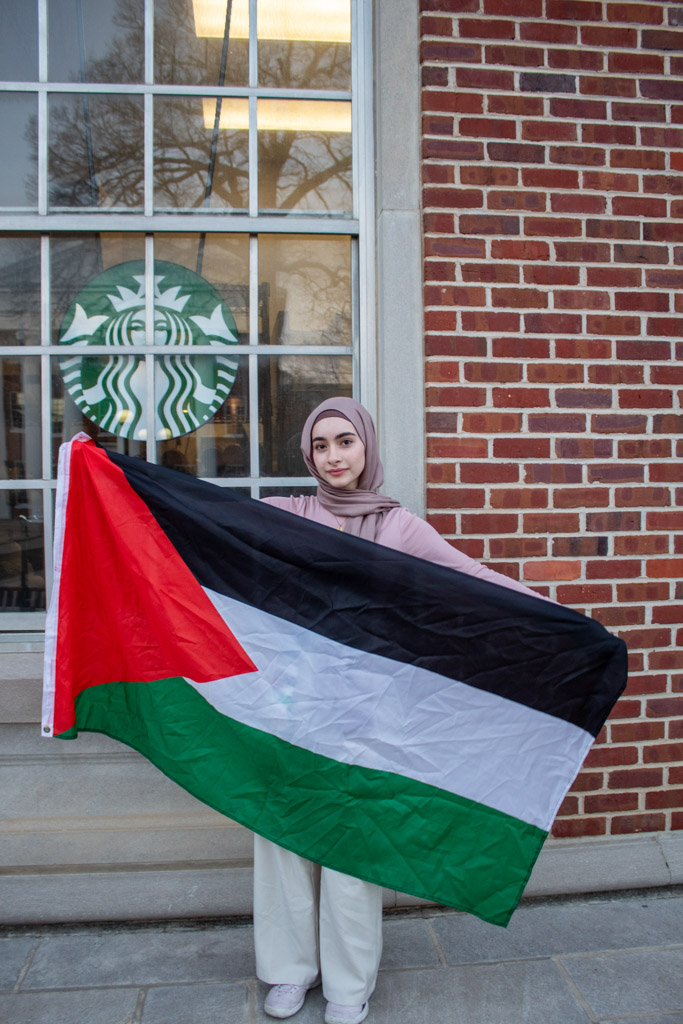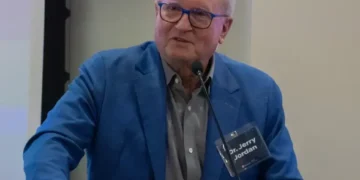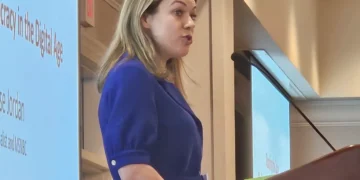
Williams Library on Feb. 6. Photo by Emily Hollowell.
Since the start of the Israel-Hamas war on Oct. 7, 2023, some UM students have shown their support of Palestine by joining boycotts of companies that they perceive to be profiting from the conflict.
Freshman psychology major and Clinton, Miss., native Roman Wells first heard about the conflict in the beginning of October 2023 via social media posts. Wells began boycotting immediately after news emerged about specific brands showing their support for Israel in the conflict.
“The first time I heard about companies that were putting money toward the destruction of towns and cities, I was like, ‘Nah, I’m boycotting Starbucks, McDonald’s, (Hewlett-Packard), Subway,’ and I’m a really big reader, so I’m boycotting most authors that have talked about supporting the Zionist movement,” Wells said.
When asked about how boycotting has affected their life, Wells replied that they don’t really think about it most of the time.
“We’re on campus and the only coffee we have is Starbucks. I guess it’s kind of inconvenient, but there are so many other coffee shops,” Wells said. “So, for the most part, it’s been about avoiding (those businesses). As soon as I saw and read about the effects of what was going on I was like, ‘This isn’t something I want to stand for.’ It was something I wanted to fight against.”
UM Marketing Professor Melissa Cinelli offered her thoughts on boycotting in general.
“Consumers participating in the boycott hope that they will ‘hurt’ the brand or company by reducing its sales and profits,” Cinelli said. “Businesses who are subject to boycotts have to worry not only about short-term loss of sales but also about damage to their brand image.”
According to Cinelli, boycotts are not as effective as they should be in theory.
“A lot of consumer spending is driven by habits, which are tough to shake, even if the consumer wants to make a statement with their spending,” Cinelli said. “If the boycotted product is purchased relatively infrequently anyway, then ‘boycotting’ amounts to doing nothing. If consumers do not believe the boycotted brand to have good substitutes, they may purchase it anyway.”
An article published by Newsweek on Jan. 30 revealed that Starbucks had lost more than 12% of shares since Nov. 16, 2023, a $15 billion loss in the company’s market valuation. This could partially be attributed to the boycotts due to the Israel-Hamas war, but there are other factors at play as well: Starbucks employees have been striking since December 2021.
Another reason Cinelli describes many boycotts to be ineffective is because of how short the news cycle is and how there is always something new to argue about. Often, consumers just forget about the initial boycott.
“It’s a question of how central the issue is to the brand and the customer base the brand is trying to appeal to,” Cinelli said.
Zynub Al-Sherri, webmaster for UM’s Muslim Student Association, is a senior public health and Arabic major. She first heard about the war immediately following her mom and sister’s return from the West Bank on Oct. 6, 2023 and is actively participating in the boycotts.
“Israel often steals aspects of Palestinian and Arab culture and claims it as its own, and hummus is one of them. Sabra is an Israeli-owned brand, and on top of that, it’s the name of a massacre that Israel played a huge part in carrying out against Palestinian and Lebanese civilians in Beirut,” Al-Sherri said. “Another brand I’ve been boycotting for a while is HP, which has supplied Israel with materials to spy on Palestinian civilians.”
Since Oct. 7, 2023, she has become more strict in her means of boycotting, going as far as making lifestyle changes to avoid supporting certain brands.
“I’ve stopped buying virtually everything I regularly used to. I have changed my makeup and skincare routines because many of those brands fall under L’Oréal, which supports Israel, such as La Roche Posay, Clinique, Cerave, NYX and many others. I’ve even had to change my menstrual products because Always is owned by Procter & Gamble, which supports Israel,” Al-Sherri said. “I’ve started boycotting Starbucks too, not because they directly support Israel, but because they filed a lawsuit against their union for coming out in support of Palestine.”
However, Al-Sherri feels as though boycotting has had a positive impact on her life as a consumer.
“I’ve replaced my everyday items with things I like even more. This has also encouraged me to eat healthier and be more conscious about where my money goes in general,” Al-Sherri said. “I’m also forced to shop more locally now and support smaller businesses, and that’s a win in my book.”
The Oxford native describes boycotting as an “easy, nonviolent form of resisting the occupation and genocide.”
Al-Sherri suggests that many people should boycott as much as they can and that being an agent of change is a lot easier than people think it is.
“I think people have this idea that they’re incapable of causing change to happen, but it’s this mindset that allows oppressors to thrive,” Al-Sherri said. “Small actions in massive numbers create long-lasting and big change, and that’s what boycotting is all about.”
Al-Sherri expressed that boycotting is a deeply personal choice for her to make due to the fact that the act is extremely personal for her because she is Palestinian herself and has family in Palestine.
“I want to see my country free,” Al-Sherri said. “Palestinians, like all people, deserve safety and equality under the law.”





































